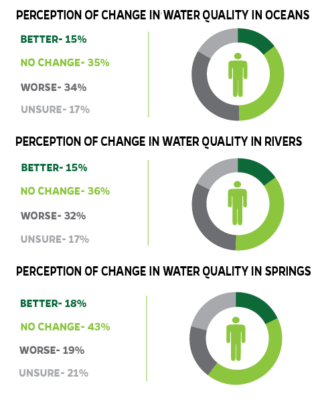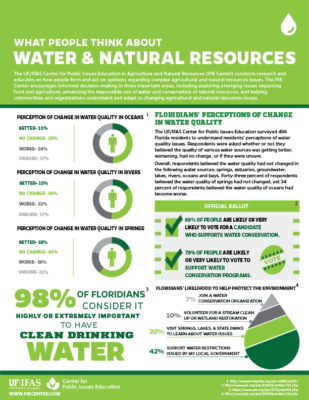The UF/IFAS Center for Public Issues Education in Agriculture and Natural Resources (PIE Center) conducts research and educates on how people form and act on opinions regarding complex agricultural and natural resources issues. The PIE Center encourages informed decision-making in three important areas, including exploring emerging issues impacting food and agriculture, advancing the responsible use of water and conservation of natural resources, and helping communities and organizations understand and adapt to changing agricultural and natural resources issues.
The PIE Center surveyed 496 Florida residents to understand residents’ perceptions of water quality issues. Respondents were asked whether or not they believed the quality of various water sources was getting better, worsening, had no change, or if they were unsure.
Overall, respondents believed the water quality had not changed in the following water sources: springs, estuaries, groundwater, lakes, rivers, oceans and bays. Forty-three percent of respondents believed the water quality of springs had not changed, yet 34 percent of respondents believed the water quality of oceans had become worse.
While majority of respondents believ e there was no change in the quality of water, there was prominent concern to have clean drinking water among Floridians. Ninety-eight percent of those surveyed consider it highly or extremely important to have clean drinking water.
e there was no change in the quality of water, there was prominent concern to have clean drinking water among Floridians. Ninety-eight percent of those surveyed consider it highly or extremely important to have clean drinking water.
“Our research findings show the public is engaged in and concerned about our water supply,” said PIE Center associate director Alexa Lamm. “As we think about protecting water and maintaining our supply we need to be sure the public is educated when they make decisions about policy that impacts the natural resources that make Florida such an amazing state.”
Lamm is an associate professor of agricultural education and communication and leads research efforts on the public perception of water use.
Sixty-nine percent of people are likely or very likely to vote for a candidate who support water conservation, and 79 percent are likely or very likely to vote in favor of water conservation programs.
Aside from voting, Floridians also express interest in being civically engaged regarding water conservation practices.
When ask how likely they were to engage in behaviors to help protect the environment, seven percent reported that they were likely to join a water conservation organization. This was follow by 10 percent who were likely to volunteer for a stream clean up or wetland restoration.
Twenty percent of respondents were likely to visit springs, lakes, and state parks to learn about water issues, and 42 percent said they were likely to support water restrictions issues by local government.
Media contact: Ashley McLeod, ashleynmcleod@ufl.edu or 352-273-0793
Alexa Lamm, alamm@ufl.edu or 352-392-6545

















